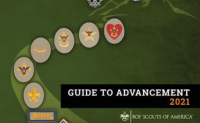In the first part of this topic, we talked about steps the troop committee can take to help the troop prepare for summer camp. Â Let’s continue with a few more things the committee needs to make sure happen prior to camp.
- Selling the camp program – Parents who are new to Boy Scouts may be hesitant to send their sons off for a week in the woods without them. Â The committee’s responsibility is to educate parents about summer camp. Â This includes the value of summer camp – the camaraderie, advancement, bonding with the troop, learning self-reliance, personal achievement, trying new things, all in a trusted Scouting environment. Â It also includes the mechanics of what to expect, what needs to be done to prepare, how the camp operates, how boys will get there and back, which adults will be at camp with the boys, and when and how parents can come and visit (and if they should). Â Homesickness is a big issue with first-year campers (and sometimes the parents too), so be sure to provide resources and advice on dealing with it.
- Health form requirements – Hopefully, your troop is collecting and filing the new individual health and medical record forms on each member (youth and adults). Â Parts A and C Â are to be completed and kept on file. Â Summer camp, or any long-term camping lasting more than 72 hours, requires Part B to be completed as well. Â Part B requires a doctor’s exam and signature, and must have been completed within the 12 months prior to camp. [See below] These are new requirements this year and many parents are not familiar with them. Â Parents new to Boy Scouts are probably unaware of the need for a physical (and no, you can’t use a physical from another activity, such as school or sports, attached to the BSA form), and parents who have been around a while may not know the need for an annual physical, rather thinking that for youth it’s only due every three years. Â The committee needs to make parents aware of these requirements and track the return of the health forms to make sure everyone is in compliance. Â You don’t want the heartbreak of a boy turned away from camp because he didn’t have his medical forms completed properly. Â In Michigan, we have a new requirement that any adult present at summer camp must have a letter from the state’s department of health stating that he or she does not appear on the central registry of child abusers. Â Many other states have a similar requirement. Â Your camp should have details.
- Determine equipment and supply needs – Are you using your troop’s tents or the camp’s? Â What about meal preparation – are you doing it yourself or eating in the dining hall? What other equipment will you need? Shelters, tables/chairs, lanterns, water coolers? Are you bringing your troop trailer? If so, who is towing it up and back? You need to make sure everything needed is available and transported to camp. Â Use previous years’ experience as a guideline, but review the list, make any changes necessary, and make sure you have everything you need.
Next time we’ll pick up with ways the troop committee can provide support during summer camp week.
Note: Since this post was written, the BSA has again revised the personal health and medical record form, and rearranged the parts. Part A is still the basic personal information, but Part B is now the certification (signature) section, and Part C is the medical practitioner’s examination. The procedures are still the same — a physical exam is required annually for all ages for activities lasting over 72 hours.
Other articles in this series:
- Getting ready for summer camp, part 1
- Getting ready for summer camp, part 3
- Summer Camp: after you’re home




